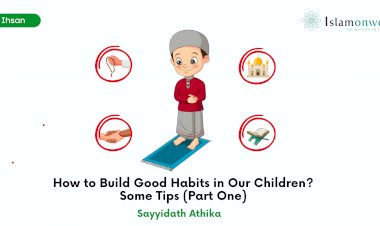Alpha Gen Parenting: Raising Responsible and Confident Children
Parents today face more challenges than ever before. Raising the Alpha Generation children (those born between 2010-2024) growing up in a world full of technology, fast changes, and big expectations is a big responsibility. These kids are smart and curious, but they also need strong guidance.
As the mother of three Alpha Gen kids, I often wonder how to raise them in an Islamic and meaningful way. This concern is not mine alone, I’ve heard the same worry from many parents around me. If you’re a parent, you may also be looking for simple, practical ways to raise your children in today’s world without losing sight of your values.
Here, I’ve shared a few simple and thoughtful points to help you along the way. Unlike traditional parenting, we now need to be more inclusive listening to our children, involving them, and guiding them with care and understanding.
Let’s look at some simple and effective ways to support their growth, step by step.
- Let Them Explore Freely
Children are naturally curious, especially after the age of three. They love to explore, make a mess, ask questions, and try new things. This curiosity is a powerful part of their learning process. Even if their play gets noisy or messy, it’s important to encourage it, because this is how they begin to understand the world around them. Through exploration, they develop problem-solving skills, creativity, and confidence.
For example, when a child pours water during play or builds something with blocks, they are learning about balance, cause and effect, and decision-making. We don’t need to step in and correct every mistake. Instead, we can watch, support, and ask gentle questions to guide their thinking.
Also, when they try to help with small chores like wiping a table, watering plants, or putting their toys away we should welcome their help. Even if the result isn’t perfect, their willingness to take part is what matters. Saying “Yes, you can help” sends a powerful message: Your efforts are valuable. This builds a sense of responsibility and ownership, which leads to greater confidence as they grow.
- Boost Their Inner Strength
Every child has the potential to grow strong from within. As parents, our role is to help them believe in their abilities. Instead of doing everything for them or constantly giving advice, we should involve them in real-life tasks and simple decision-making. When children feel that their choices matter and their efforts are valued, their confidence grows naturally. They start to see themselves as capable and responsible, which boosts their inner strength and independence.
- Be a Good Listener
Love is not just about giving gifts or saying kind words. it’s about giving your full attention. One of the most powerful ways to show love to your child is by truly listening to them. From early childhood, we should build the habit of asking them about their day and listening with interest and care.
For example, when your child comes home from school, ask them gently, “Can you tell me five things that happened today?” This helps them reflect on their experiences and express their emotions. Make it a two-way conversation share a few things about your own day too. When children see you participating, they feel valued and connected.
If your child is quiet or doesn’t feel like talking, don’t worry. Be patient and consistent. Over time, they will start opening up. This simple habit helps build a strong emotional bond between you and your child. It also teaches them that their feelings matter and that home is a safe space where they can share anything without fear.
- Ownership Starts at Home
One of the best ways to build this sense of responsibility is by involving children in everyday family tasks like making the bed, cooking, cleaning, gardening, or setting the table. These simple activities teach them valuable life skills while also helping them feel like an important part of the family. When children contribute to the home, they begin to understand the effort that goes into daily life.
Doing chores may seem small, but it sends a big message: You are needed. You can help. This sense of ownership builds confidence, encourages teamwork, and helps children become more independent and appreciative of their environment.
Children should know about money, savings, and how the family works. Treat them like young adults with growing minds. Let them hear family discussions. Ask their opinions. Let them take part in decision-making in small ways. This gives them a sense of belonging and builds maturity.
Even in simple tasks like cleaning their room they may not feel like doing it. But when we join them, make it fun or colorful, they slowly begin to enjoy it.
- Give the Right Kind of Freedom
Children need space to think, explore, and make choices. Constantly forcing them to follow our instructions can limit their growth. Instead, when we allow them to create their own order, we encourage independence and spark creativity. From this freedom, something truly beautiful can emerge.
One simple way to offer freedom, especially in early childhood, is by giving them limited choices. For example, instead of deciding everything for them, ask: "Would you like to wear this outfit or that one?" This allows them to think, decide, and express themselves. It builds confidence and decision-making skills.
However, freedom does not mean a lack of boundaries. It must be given with care. Too much freedom too soon can confuse or overwhelm a child. Clear, consistent rules are essential. When parents remain calm and steady, children learn to respect rules—not out of fear, but through understanding and trust.
- Be Patient and Emotionally Present
Patience is often tested in parenting, but it's important to remember that children are still learning how to manage their emotions and behavior. Reacting with harsh words, shouting, or giving in to every demand does not help them grow. The best approach is a balanced one, neither too strict nor too lenient.
Children express their feelings in different ways, some through tantrums, others by staying quiet or withdrawing. Every child is unique, and what works for one may not work for another. That’s why being emotionally present is key. Take time to listen, observe, and understand what your child is truly feeling, even if they can’t express it well in words.
For example, if your child is upset after school, instead of immediately correcting their behavior, try saying, “I see you’re feeling sad. Want to talk about it?” This shows empathy and opens the door for communication. Gently guide them, help them label their emotions, and show them how to respond in a healthy way. At the same time, be firm about boundaries and values—children need to know what is right and wrong to feel secure and guided.
- Build Delayed Gratification
In today’s fast-paced world, many children expect instant rewards whether it’s chocolates, toys, or screen time. But one of the most valuable lessons we can teach them is how to wait. For example, give your child two chocolates one for today and the other for tomorrow. This small, simple exercise helps them practice patience and understand that waiting can bring its own reward.
This is called delayed gratification. A child who learns to wait develops self-control and patience skills that will help them face real-life challenges, even more than high test scores. These early lessons build emotional strength that lasts into adulthood.
- Encourage Sibling Responsibility
If you have more than one child, involve the elder ones in caring for the younger ones. Let them help with feeding, playing, or calming a younger sibling. This builds a sense of care, empathy, and leadership.
- Set an Example, Always
Children watch more than they listen. If we spend time on violent movies or games, they may follow. We must be careful about what we allow them to see. If we teach them patience, respect, and love through our actions, they will learn the same.
- Conclusion
Raising the Alpha Generation is not about giving them everything or being strict all the time. It’s about being there for them, letting them grow, and showing them what real life looks like step by step. If we nurture their inner strength, give them space, and build a strong family connection, they will grow into confident people, ready to take ownership.
Don’t forget “Days are long but years are short”. Our children, as children, who always need us, are with us for a short time. Let’s celebrate with patience, care, growth.
About the author:
Sayyidat Athika is interested in reading and researching about parenting and family leadership. Email: ashimol9633@gmail.com .
Disclaimer
The views expressed in this article are the author’s own and do not necessarily mirror Islamonweb’s editorial stance.
























Leave A Comment